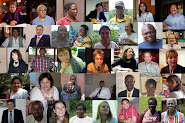by Sarah Glover
We had a guest speaker at CCL recently, Martin Tan, who is co-founder and Executive Director of the Halogen Foundation in Singapore. His presentation and my conversation with him really got me thinking about how I can better connect my personal passions and volunteer work with CCL work. I’ve always wanted to work with “disadvantaged populations”. I feel a calling to do what I can toward leveling the playing field, so to speak. So in my first conversation with Martin, before his presentation, I was thinking about that kind of work and trying to mentally apply what he was saying to helping people who are disempowered -- people who are far from the typical CCL clientele.
We were talking about role models and images of “leaders” that children grow up with and how important it is to have a model that you can actually imagine yourself emulating. If our image of “a leader” and the role models we think of are powerful public figures like kings or presidents, or exceptional heroes like Mother Theresa or Mohandas Gandhi, not many of us will feel like we can meet that level of criteria to be “leaders”. However, if our image of a leader includes someone like a parent, coach, teacher, or neighbor, then many more of us will feel hopeful that we too can be leaders.
The degree to which children are encouraged to aspire to leadership varies quite a bit – across culture, class, and family (I need to find out if there is research on this). Some children are raised from birth to think of themselves as leaders or to aspire to be leaders, and good role models are pointed out to them and placed in their path. They are applauded when they exercise leadership behaviors and chastised when they are too passive. Other children are raised from birth to think of themselves as followers, and whenever they try to exercise leadership they are chastised for being too assertive and are encouraged to “step back in line”. They receive praise for compliance and good humor. For these children, the good leaders they encounter in their lives are nice to follow but irrelevant as role models.
Neither of these two extremes is necessarily better than the other. There are positive and negative consequences of raising children for leadership: one positive is building their self-confidence; one negative might be creating feelings of superiority which can lead to arrogance. Likewise, there are positive and negative consequences of raising children to follow: one positive is developing cooperative behavior; one negative could be creating feelings of powerlessness which can lead to apathy or resentment.
The world needs people to follow as much as it needs people to lead: we need young people to grow up feeling confident and cooperative, feeling neither “entitled” nor “victim”. What if, instead of categorizing ourselves as leaders or followers, we more mindfully encouraged every person to be both?
This insight is not completely new in the world, but it got me thinking in a new way about what I want to do. The Halogen Foundation are already operating from the belief that all humans can be leaders and that all leaders need to know how to (and be willing to) follow. They define leadership very simply for young people: it’s influence. You can influence people for good or ill, but either way you are leading. They tell young people, “All of you have this capability.”
One thing in particular that Martin said made an impression on me: that Halogen will refuse to do leadership development programs for any subset of students in a school – whether the elite or the disadvantaged. Doing either would undermine their message of equality, so they’ll only do programs for the whole school. Halogen’s work serves the elite and the disadvantaged at the same time and brings them closer together. So now I’m re-thinking my own focus on a subset of the population. Why would my message (whatever exactly it is!) not apply to everyone equally? Food for thought.
How Disasters Can Move Us to a Sense of Community
-
I haven't posted to this blog in years but was inspired to do so by the
fresh insights in an interview with Rebecca Solnit's about her book, *A
Paradise Bu...
12 years ago



















